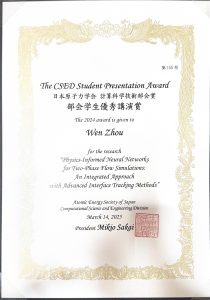2025年04月07日
【Awards and Commendations】Wen ZHOU, Okamoto/Miwa lab, Department of Nuclear Engineering and Management, (D3)
On 3/14/2025, Wen ZHOU, Okamoto/Miwa lab, Department of Nuclear Engineering and Management, (D3), received the “Student Presentation Award” at the Atomic Energy Society of Japan, Computational Science and Engineering Division.
〈Name of award and short explanation about the award〉
A student who gave an exemplary presentation serving as a model for others in the Computational Science and Engineering Division of the Atomic Energy Society of Japan is awarded.
〈About awarded research〉
This study aims to develop a robust and generic Physics-informed Neural Networks (PINNs) for two phase flows by incorporating the Navier-Stokes equations and three advanced interface tracking methods—specifically, the Volume of Fluid, Level Set, and Phase-Field method—into an improved PINNs framework. The improved PINNs then is optimized by minimizing both the residual and loss terms of partial differential equation. By incorporating the three different interface tracking methods and automatic refinement techniques based adaptive residual sampling, it efficiently handles high-order derivative terms and adaptively captures the phase interface. The case of single rising bubble in two-phase flows is simulated to validate the robustness and accuracy of the improved PINNs. The accuracy of the simulations is compared with the velocity, pressure, and phase field against CFD solutions. The results indicate that the improved PINNs coupled with these interface tracking methods offers a satisfactory consistency in simulating rising bubble.
〈Your impression & future plan〉
It is a great honor to receive the “Best Presentation Award” at the AESJ 2024 Spring Meeting, especially in such a highly competitive environment with brilliant student researchers from around the world. I would like to express my sincere gratitude to my supervisors, Professors Miwa, Okamoto, and Suzuki, for their exceptional mentorship, guidance, and constant support. Their expertise has been instrumental in shaping the direction of my research.
Looking ahead, I am eager to continue exploring innovative solutions in thermal hydraulics and nuclear engineering, with a particular focus on the application of artificial intelligence. I am committed to advancing the field by developing more efficient, robust, and scalable methods, especially in areas involving complex fluid dynamics and multiphase flow simulations. I look forward to collaborating with experts in both academia and industry to contribute to the ongoing advancements in nuclear energy technologies.



